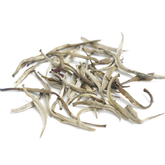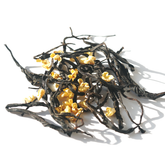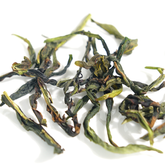Types Of Black Tea And The History Of Its Origin
History of Black Tea
 Legend has it that black tea was discovered in the Wuyi Mountains of China, one of the most famous tea-producing regions in the country. The story goes that during a tea-picking season, an army from the north marched through the region and decided to spend the night at a tea factory. The soldiers slept on freshly picked tea leaves all night. The following day, after the army had left, the fresh tea leaves had turned black. Afraid that the tea would spoil, the farm owner rolled the leaves and dried them over a pine wood fire. To his surprise, the processed tea turned dark and emitted a unique pine-smoked aroma. This accidental discovery showed that fermenting and roasting tea leaves could create a brand-new flavor. Since it couldn't be sold locally, the farm owner brought the tea to other markets and surprisingly received a great reception there. The next year, merchants paid a high price for purchasing this tea, and with that, the world's first black tea, Lapsang Souchong, was born. Ever since then, black teas were produced, and an independent black tea processing technique came into being.
Legend has it that black tea was discovered in the Wuyi Mountains of China, one of the most famous tea-producing regions in the country. The story goes that during a tea-picking season, an army from the north marched through the region and decided to spend the night at a tea factory. The soldiers slept on freshly picked tea leaves all night. The following day, after the army had left, the fresh tea leaves had turned black. Afraid that the tea would spoil, the farm owner rolled the leaves and dried them over a pine wood fire. To his surprise, the processed tea turned dark and emitted a unique pine-smoked aroma. This accidental discovery showed that fermenting and roasting tea leaves could create a brand-new flavor. Since it couldn't be sold locally, the farm owner brought the tea to other markets and surprisingly received a great reception there. The next year, merchants paid a high price for purchasing this tea, and with that, the world's first black tea, Lapsang Souchong, was born. Ever since then, black teas were produced, and an independent black tea processing technique came into being.
In the early 16th century (1506), Portugal invaded China and thus learned about tea culture, marking the beginning of tea trade with the West. By 1601, the Dutch had established trade with China, and the Dutch East India Company was established in 1602. In 1606, a Dutch merchant ship carried tea from Java to Macau and thence to Europe in 1609. This marked the earliest record of tea being transported to Europe, officially presenting Chinese tea to the Western world. During the 17th and early 18th centuries, tea became the Dutch East India Company's main commodity.
In 1662, an almost romantic tale with black tea occurred at an English royal wedding. When the Portuguese Princess Catherine married the English King Charles II, black tea formed part of her dowry and was introduced into Buckingham Palace. Guests at the wedding feast were surprised to find that most of the high-stemmed glasses Catherine was raising were not filled with wine but with a mysterious, then little-known Chinese beverage called black tea. The princess's love for black tea gave her the nickname "Tea Queen" among the nobility. Since then, black tea has gradually blended into British society and become a fashion and etiquette symbol.
Soon after, there emerged a tradition of afternoon tea in England. Finally, countries like India, Sri Lanka, Indonesia, and Kenya started learning how to process black tea leaves from China. Black tea still spread all over the world. Today, black tea, together with cocoa and coffee, is one of the "world's three major beverages.
Famous Chinese Types Of Black Tea
Origin: Tongmuguan, Wuyi Mountains, Fujian Province
Historical Background: The world's first black tea, which was created in the middle of the 17th century, pioneered the fermentation process in black tea production.
Flavor Profile: Deep red-colored brew with a pine-smoked aroma and unique sweet fragrance, rich, and full-bodied.
Processing: Fermentation and roasting of leaves over pine wood give this tea its strong, smoky aroma.
Keemun Black Tea (Qimen Hong Cha)
Origin: Qimen County, Huangshan City, Anhui Province
Historical Background: Keemun was created by a tea merchant named Yu Ganchen in the year 1875 after learning and perfecting techniques for black tea in Fujian; also known as the "King of Black Tea."
Smell and Taste: Flavor profile-the bright red infusion gives off distinctive "Keemun aroma." It is the combination of floral and fruit notes while the taste is fresh and mellow and sweet.
International Reputation: Keemun Black Tea has won many awards in international tea competitions and is favored by the British royal family.
Dianhong Black Tea
Origin: Lincang and Baoshan, Yunnan Province
Historical Background: Created in 1939, it uses large-leaf tea trees from Yunnan as raw material, which are ideal for making black tea.
Flavor Profile: The tea brew is golden-red and transparent, with a strong and full-bodied taste. It has prominent honey and floral-fruity aromas with a sweet aftertaste.
Characteristics: The tightly rolled tea leaves display golden tips, and the tea is highly resistant to multiple infusions.
Chuanhong Gongfu Tea
Origin: Yibin, Sichuan Province
Historical Background: This tea was created in the 1950s and is made from Sichuan large-leaf tea, using traditional black tea fermentation techniques.
Flavor Profile: The tea brew is bright red with high floral and honeyed aromas, offering a sweet and mellow taste.
Origin: Zhenghe, Fu'an, and Fuding in Fujian Province
Historical Background: Minhong includes Zhenghe Gongfu, Tanyang Gongfu, and Bailin Gongfu. With a long history, it was once a major export tea category in China.
Flavor Profile: The taste is mellow with soft floral and fruity aromas, and the brew is bright red and clear.

Types Of International Black Tea that are Renowned
Assam Black Tea – India
Origin: Assam, India, in the Brahmaputra River Valley with a humid and hot climate suitable for fast growth in teas.
Flavor Profile: The brew is deep red, thick, smooth in taste, with a distinctive malty aroma.
History of Plantation: Although discovered in 1823 by British explorer Robert Bruce, large-scale planting was started in the 1830s with Chinese black tea techniques.
Famous Brands: Tata Tea, Halmari Tea, Assamica Agro.
Darjeeling Black Tea – India
Origin: Darjeeling, West Bengal, at 1,200–2,000 meters above sea level, in a cool, mountainous climate.
Flavor Profile: The tea has a fresh, soft taste with floral and grape-like fruity aromas, often called the "Champagne of Teas."
Famous Brands: Makaibari, Glenburn Tea Estate, Castleton.
Origin: Kandy, Nuwara Eliya, and Uva in Sri Lanka.
Flavor Profile: Low-altitude teas are robust with high aroma, while high-altitude teas are light and refreshing.
Famous Brands: Dilmah, Lipton, Mlesna.
Kenyan Black Tea – Kenya
Origin: Kenya Highlands (1,500–2,700 meters above sea level).
Flavor Profile: The tea has a rich, bold taste with light fruity notes.
Famous Brands: Kericho Gold, KETEPA, Safari Tea.
Conclusion
Chinese black tea originated during the Ming Dynasty when the fermentation process was discovered by accident, leading to the creation of Lapsang Souchong. During the 17th century, black tea had entered Europe through trade and became a symbol of nobility, especially cherished by the British royal family. Thus, afternoon tea came into being, and black tea techniques reached out to India, Sri Lanka, Africa, and so on, producing various types of black tea such as Assam Black Tea, Darjeeling Black Tea, Ceylon Black Tea, and Kenyan Black Tea. Today, black tea, along with coffee and cocoa, is one of the world's three major beverages.
Health-benefits-of-chinese-tea
How-to-brew-loose-leaf-tea






